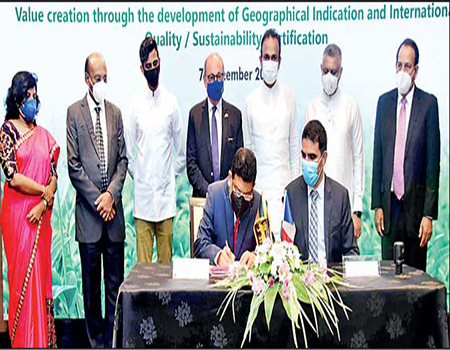
Please Share your Email if you Wish to Receive the Golden Tips & Tales Newsletter from History of Ceylon Tea Website

Sri Lanka has entered into a tripartite agreement to facilitate the process of registering the Geographical Indicator (GI) for Ceylon Tea.
The French Development Agency (AFD) on behalf of the Government of France has agreed to provide a € 1 million (over Rs. 230 million) grant as technical assistance to the Sri Lanka Tea Board (SLTB) through Centre de Coopération International en Recherche Agronomiquepour le Développement (CIRAD) for the development of GI for Ceylon Tea.
The agreement was signed by AFD Country Director Rida Shawd and SLTB Chairman Jayampathy Molligoda in the presence of Plantation Industries Minister Dr. Ramesh Pathirana and French Ambassador Eric Lavatu.
On 25 October, the Cabinet of Ministers approved the proposal submitted by the Plantation Industries Minister to enter into a tripartite agreement to secure the agreed technical assistance.
The creation of a GI for Ceylon Tea is aimed at promoting quality products, protecting the traditional know-how it is based upon, and enhancing its commercial value and recognition in international markets.
This grant will provide technical assistance for over four years to establish GI and the relevant certification systems for ‘Ceylon Tea’. It will enable the CIRAD, which has proven experience in the implementation of geographical indications, and the United Nations Industrial Development Organisation (UNIDO), which has been working for several years on the establishment of a GI for Ceylon Cinnamon, to support SLTB and numerous actors from the tea industry.
Sri Lanka’s tea sector dates back over 150 years and is the second highest foreign exchange earner of the economy. ‘Ceylon Tea’, identified by the Lion Logo, exhibits unique qualities with a range of flavours and aroma.
The geographical aspects and conditions of each of the seven tea-producing regions have significant influences on the characteristics of the teas they produce. Despite its uniqueness, ‘Ceylon Tea’ does not have protection to uphold and to authenticate the quality reputation of the product.
Counterfeit Ceylon tea is sold in various consumer countries. The GI certification serves to uphold and authenticate the quality, reputation and characteristics of a product by linking them to a specific territory through intellectual property protection, while also giving it added value in national and international markets.
Through this process, the ‘Ceylon Tea’ value chain is expected to become more productive, inclusive and sustainable. Ceylon Tea will have enhanced value-addition in international markets through intellectual property protections and national and international certifications.
The SLTB secured registrations for seven major agro-climatic regional teas locally in 2011 after obtaining registration for ‘Ceylon Tea’ as a Certification Mark.
The GI registration under the Trade-Related Intellectual Property Rights Agreement is expected to prevent counterfeiting and reduce the misuse of Ceylon Tea with a high level of protection, while ensuring consumers with authentic/genuine Ceylon Tea products. This is in particular given the difficult and expensive task of surveillance and prevention of illegal usage of the Ceylon Tea name worldwide.
Tea and Rubber Export Promotion State Minister Kanaka Herath, Community Infrastructure State Minister Jeewan Thondaman, Plantation Industries Ministry Secretary Ravindra Hewawasam, SLTB Director General Anura Siriwardana and SLTB Promotion Manager Pavithri Peiris were also present.
Comments
(In keeping with the objectives of this website, all COMMENTS must be made in the spirit of contributing to the history of this estate, planter or person i.e. names, dates & anecdotes. Critical evaluations or adverse comments of any sort are not acceptable and will be deleted without notice – read full Comments Policy here)